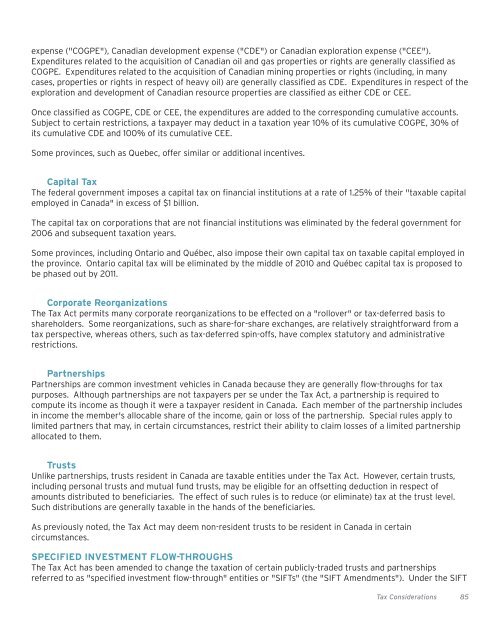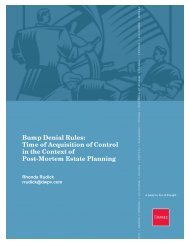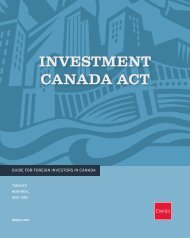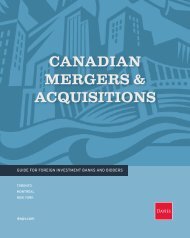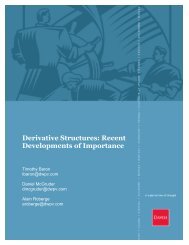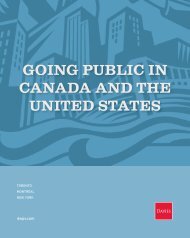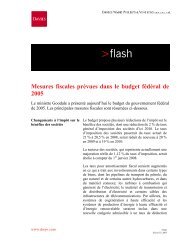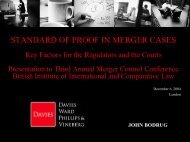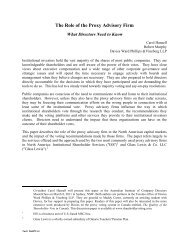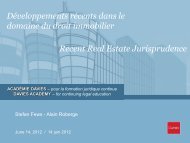doing business in canada - Davies Ward Phillips & Vineberg LLP
doing business in canada - Davies Ward Phillips & Vineberg LLP
doing business in canada - Davies Ward Phillips & Vineberg LLP
- No tags were found...
Create successful ePaper yourself
Turn your PDF publications into a flip-book with our unique Google optimized e-Paper software.
expense ("COGPE"), Canadian development expense ("CDE") or Canadian exploration expense ("CEE").Expenditures related to the acquisition of Canadian oil and gas properties or rights are generally classified asCOGPE. Expenditures related to the acquisition of Canadian m<strong>in</strong><strong>in</strong>g properties or rights (<strong>in</strong>clud<strong>in</strong>g, <strong>in</strong> manycases, properties or rights <strong>in</strong> respect of heavy oil) are generally classified as CDE. Expenditures <strong>in</strong> respect of theexploration and development of Canadian resource properties are classified as either CDE or CEE.Once classified as COGPE, CDE or CEE, the expenditures are added to the correspond<strong>in</strong>g cumulative accounts.Subject to certa<strong>in</strong> restrictions, a taxpayer may deduct <strong>in</strong> a taxation year 10% of its cumulative COGPE, 30% ofits cumulative CDE and 100% of its cumulative CEE.Some prov<strong>in</strong>ces, such as Quebec, offer similar or additional <strong>in</strong>centives.Capital TaxThe federal government imposes a capital tax on f<strong>in</strong>ancial <strong>in</strong>stitutions at a rate of 1.25% of their "taxable capitalemployed <strong>in</strong> Canada" <strong>in</strong> excess of $1 billion.The capital tax on corporations that are not f<strong>in</strong>ancial <strong>in</strong>stitutions was elim<strong>in</strong>ated by the federal government for2006 and subsequent taxation years.Some prov<strong>in</strong>ces, <strong>in</strong>clud<strong>in</strong>g Ontario and Québec, also impose their own capital tax on taxable capital employed <strong>in</strong>the prov<strong>in</strong>ce. Ontario capital tax will be elim<strong>in</strong>ated by the middle of 2010 and Québec capital tax is proposed tobe phased out by 2011.Corporate ReorganizationsThe Tax Act permits many corporate reorganizations to be effected on a "rollover" or tax-deferred basis toshareholders. Some reorganizations, such as share-for-share exchanges, are relatively straightforward from atax perspective, whereas others, such as tax-deferred sp<strong>in</strong>-offs, have complex statutory and adm<strong>in</strong>istrativerestrictions.PartnershipsPartnerships are common <strong>in</strong>vestment vehicles <strong>in</strong> Canada because they are generally flow-throughs for taxpurposes. Although partnerships are not taxpayers per se under the Tax Act, a partnership is required tocompute its <strong>in</strong>come as though it were a taxpayer resident <strong>in</strong> Canada. Each member of the partnership <strong>in</strong>cludes<strong>in</strong> <strong>in</strong>come the member's allocable share of the <strong>in</strong>come, ga<strong>in</strong> or loss of the partnership. Special rules apply tolimited partners that may, <strong>in</strong> certa<strong>in</strong> circumstances, restrict their ability to claim losses of a limited partnershipallocated to them.TrustsUnlike partnerships, trusts resident <strong>in</strong> Canada are taxable entities under the Tax Act. However, certa<strong>in</strong> trusts,<strong>in</strong>clud<strong>in</strong>g personal trusts and mutual fund trusts, may be eligible for an offsett<strong>in</strong>g deduction <strong>in</strong> respect ofamounts distributed to beneficiaries. The effect of such rules is to reduce (or elim<strong>in</strong>ate) tax at the trust level.Such distributions are generally taxable <strong>in</strong> the hands of the beneficiaries.As previously noted, the Tax Act may deem non-resident trusts to be resident <strong>in</strong> Canada <strong>in</strong> certa<strong>in</strong>circumstances.SPECIFIED INVESTMENT FLOW-THROUGHSThe Tax Act has been amended to change the taxation of certa<strong>in</strong> publicly-traded trusts and partnershipsreferred to as "specified <strong>in</strong>vestment flow-through" entities or "SIFTs" (the "SIFT Amendments"). Under the SIFTTax Considerations 85


